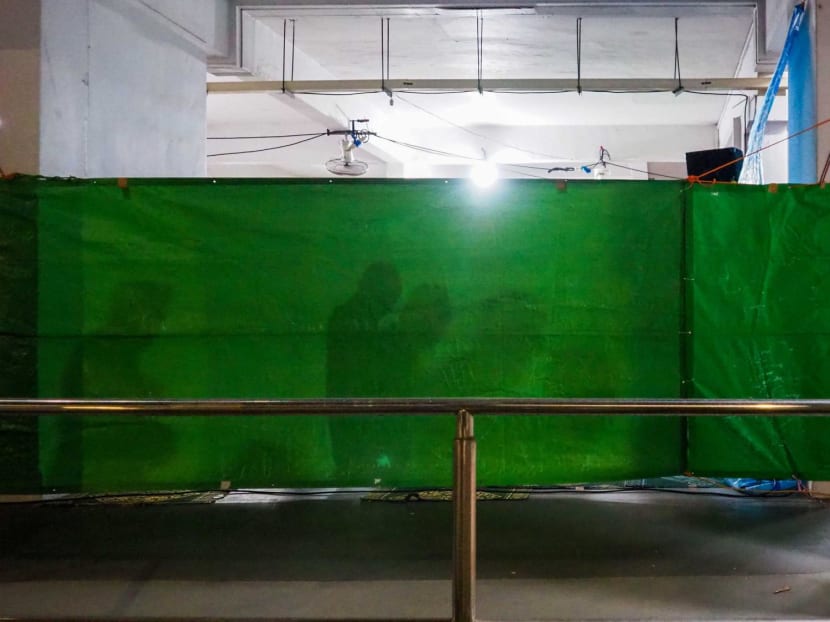Void deck prayer halls: Annual Ramadan tradition brings convenience to elderly, strengthens bonds among Muslims
SINGAPORE — For about 30 years, Mr Samat Aripin has been going to the same void deck near his house in Simei to perform congregational tarawih prayers — a special prayer performed by Muslims only during the fasting month of Ramadan.

Muslims performing tarawih prayers at the void deck of Blk 432, Jurong West St 42, on April 1, 2023.
- Every Ramadan, some void decks get converted into temporary halls for Muslims to perform tarawih prayers
- This ground-up initiative began in the 1980s, making congregational prayers more accessible for neighbourhoods without mosques
- It is seen as a practice of inclusivity as it ensures the elderly and less mobile do not get excluded from the communal practice
- Residents told TODAY that such a tradition also allows for neighbours to bond with each other
SINGAPORE — For about 30 years, Mr Samat Aripin has been going to the same void deck near his house in Simei to perform congregational tarawih prayers — a special prayer performed by Muslims only during the fasting month of Ramadan.
At the void deck, volunteers would have set up a makeshift prayer hall laid out with plastic mats.
“The initiative was entirely ground up, with neighbours chipping in to their best ability. Some bought the prayer mats, others set up the sound system and so on. My late father was one of the imams who led the prayers,” said the 60-year old.
“It was really the kampung spirit brought over to the public flats.”
His annual routine was disrupted for the first time in 2020 when such spaces were closed down due to Covid-19 infection controls.
This Ramadan, the authorities allowed only 14 of such makeshift prayer halls to be reopened around the island. The one in Mr Samat’s neighbourhood was not one of them.
“We accept the outcome, but we do feel a slight loss as it has been three years. It’s especially tough for the elderly and those without their own transport, who may find it more challenging to get to the mosque,” said Mr Samat, whose home is about 15 minutes away from the nearest mosque.
To attend congregational tarawih prayers, Muslim families would typically have to break fast and perform their obligatory dusk prayers at home before heading to the nearest mosque — all within an hour or so.
“It takes about half an hour to reach the mosque from here. It’s really challenging for the elderly, to have to switch buses and so on,” said Tampines resident and qaryah committee member Baithullah Ahmed Hassan, 62.
Meanwhile, 26-year-old Muhammad Ibrahim said: “For seniors like my father-in-law, it’s more convenient to head to a block nearby compared to the mosque, where he has to deal with stairs and a much bigger crowd.”
Mr Ibrahim’s in-laws live in Yishun, about 20 minutes away from the nearest mosque by public transport.
To ensure those with mobility issues are able to perform their tarawih prayers, makeshift prayer spaces at void decks or multi-purpose halls come into the picture.
Administrative preparations start months ahead of Ramadan by getting approvals from the authorities.
In February, the Islamic Religious Council of Singapore (Muis) issued "support letters" for qaryah groups to organise tarawih prayers at 27 Housing and Development Board void decks or multi-purpose halls.
But on March 15, a week before Ramadan, Muis rescinded the letters, citing “sufficient prayer spaces”, though it was also announced then that congregants still needed to book slots at “mosques with high demand”.
This disrupted preparations by qaryah groups that were already underway.
“We thought this year would be a good year to finally resume void deck tarawihs, given that we have lifted pandemic restrictions. So we were very disappointed,” said a qaryah member in Woodlands who declined to be named.
A member of another qaryah in Woodlands who wants to be known only as Mr Shah said that a resident had also donated mats for the community to use this year, after initially hearing that the qaryah would be holding tarawih prayers.
"He said we don’t have to pay him back because his intention is to donate, but now we don’t know what to do with the mats. We felt it was a bit of a waste. People’s good intentions are not being fulfilled," he said, a day after Muis rescinded the letters.
Following backlash from the community, Muis reversed its decision and announced that 14 qaryahs would be setting up tarawih prayer spaces.
“I am glad that after discussions with Muis, we have come to an understanding, and Muis has been able to allow many qaryah groups to proceed with their original plans,” said Prime Minister Lee Hsien Loong on Facebook.
TODAY understands that there were a few other qaryahs that were given approval, but could not proceed with organising the prayers as the eventual approval was given too late.
BERITA Mediacorp reported that due to the 11th hour approval, one qaryah in Pasir Ris ended up forking out about S$13,000 in booking and logistic costs, and only managed to start the prayers on the fifth night of Ramadan. It typically costs a third of that price to organise such prayer sessions.
COMMUNITY BONDING
Organised by ground-up community groups called qaryahs, these makeshift prayer halls offer more than just practical convenience, said residents and qaryah committee members.
They represent a long-held tradition among the local Muslim community, and qaryahs help to bond the community through various activities.
On the eve of Ramadan, when the prayer begins, electric fans, sound systems and canvas partitions go up and mats get laid — a labour of love undertaken typically by residents in true "gotong-royong" style.
“Qaryah-organised tarawih allows the community of neighbours to get involved in setting up the area for prayers, preparation of post-prayer treats or drinks, and as a consequence get neighbours to foster better ties with each other,” said Marsiling resident Fairuz Jaafar, 26.
“Even through small acts like helping to roll up the rattan mats after prayers or picking up the prayer mats and passing it on, you do feel like you're more involved on a personal level.”
Such experiences cannot be easily replicated at mosques, where the preparation largely is done by staff and volunteers, residents told TODAY. The time taken to travel between home and the mosque leaves little opportunity for congregants to slow down and socialise with each other.
The origin of such qaryahs — which means neighbourhood — can be traced back to informal groups formed in the 1980s when people moved from villages into public flats, elderly residents and committee members said.
Such groups perform other functions too, including holding kenduri (feasts) for special occasions, forming kompang or marhaban (ensemble) groups and even sepak takraw teams, qaryah members and residents said.
COMMUNAL PRAYERS SORELY MISSED DURING PANDEMIC
Communal tarawih prayers were not allowed in 2020 due to Covid-19. In 2021, mosques began to resume organising these prayers, with a limited capacity of about 9,500 to be shared among more than half a million Muslim residents.
The capacity was expanded the following year, though congregants still needed to reserve a place before heading down to the mosque.
Ms Nuraini Nasir, 22, a Tampines resident who lives about 15 minutes’ drive away from the nearest mosque, said: “Sometimes the only available slots are at mosques which are even further.”
She added that her family members would sometimes split up and go to different mosques due to the lack of slots.
“The past three years with no void deck tarawih, I didn’t go to the mosque, I just did my prayers at home with my family,” said a 65-year-old retiree who gave his name as Abdul Rahman and walks around with the help of a walking stick.
His home in Jurong West is located about 20 minutes away by public transport to the nearest mosque.
'EXTREMELY GOOD WORK' HELPING PEOPLE
At a break fast event on March 29 with 120 qaryah representatives, Home Affairs and Law Minister K Shanmugam praised the work done by the groups.
He said: “They are doing extremely good work on the ground, a lot of social work, helping people, and also helping in the prayers, helping the community.”
Mr Abdul Rahman Surdi, chairman of a qaryah committee in Jurong West, said that his group also distributes food and basic household items to the needy in the neighbourhood several times a month, an initiative they started since Covid-19.
“And when other stakeholders like the RC (Residents' Committee) do food distribution or community aid activities, our members lend a hand as well. So we help those beyond the Malay or Muslim community, too,” he said.
Residents said that making communal prayers accessible for the elderly would become increasingly important as Singapore’s population continues to age.
As for Mr Samat, he hopes the tradition that has been practised since his father’s era will continue to be preserved.
“Of course we’ll miss void deck tarawih if it’s gone. Because it has become like an annual gathering of old friends that allows neighbours to catch up with each other,” he said.













